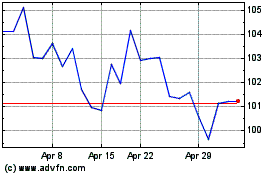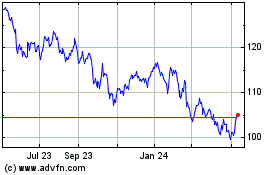Nestlé Puts Unit Under Review -- WSJ
September 21 2018 - 3:02AM
Dow Jones News
By Saabira Chaudhuri and Brian Blackstone
This article is being republished as part of our daily
reproduction of WSJ.com articles that also appeared in the U.S.
print edition of The Wall Street Journal (September 21, 2018).
Nestlé SA is exploring strategic options for its skin-health
unit, a business analysts say could fetch $4.1 billion, its latest
move to narrow its focus to food and beverages as it faces pressure
from an activist investor.
The Swiss consumer goods giant Thursday didn't specifically say
the unit, which generated 2017 revenue of 2.7 billion Swiss francs
($2.79 billion), was up for sale but such reviews often end with a
disposal. Nestlé recently sold its U.S. confectionery and Gerber
life-insurance businesses after similar reviews.
Nestlé didn't disclose an estimated value for the skin-health
division, which includes face-care products Cetaphil and Proactiv,
but it could fetch about 4 billion francs, according to Jefferies
analyst Martin Deboo. Mr. Deboo said the review was significant
because it showed a "willingness to slay sacred cows."
The move comes as Nestlé faces pressure from activist investor
Daniel Loeb who took a $3.5 billion stake in the company last year
and has made a string of demands, including that it sell its stake
in L'Oréal SA and the skin-health arm.
The review is likely to close the door on a business that Nestlé
just four years ago touted as one of its most promising. Nestlé
established its skin-health unit in 2014 after taking full control
of Galderma, which added acne and skin-cancer treatment to its
portfolio. Nestlé said at the time it wanted to take a more
holistic approach to health than "mere nutrition" and bolstered the
unit with several acquisitions including a $1.4 billion deal for
skin-care products from Valeant Pharmaceuticals Inc.
But as sales growth slowed, investors questioned how the unit
fit into Nestlé's broader business. Nestlé had until now worked to
fix problems at its skin-health business, which suffered after
investing aggressively in consumer skin-care products and as
patents on prescription products expired.
But Thursday, Nestlé said it had decided the unit's growth
opportunities "lie increasingly outside the group's strategic
scope." It expects the review to be completed by mid-2019.
Nestlé generated nearly 90 billion francs of sales last year but
is shuffling its huge portfolio of products, ranging from Maggi
noodles to Purina pet food and DiGiorno frozen pizza, to combat
slowing growth. Chief Executive Mark Schneider had committed to
shuffling 10% of Nestlé's portfolio but Thursday's announcement
goes 3% above that said Mr. Deboo.
Like other consumer-goods companies, Nestlé has struggled with
changing consumer tastes that favor local, organically produced
food and difficulty in raising its prices amid a low-inflation
environment. Mr. Schneider hopes that by narrowing its focus to
fast-growing parts of its business including coffee, bottled water
and pet food, he can lift sales growth, which last year weakened to
its slowest pace since at least the mid-1990s.
On Monday, Nestlé said it would sell its Gerber Life Insurance
unit to Western & Southern Financial Group for $1.55 billion in
cash. In January, it sold its U.S. confectionery business -- which
includes Butterfinger and Baby Ruth candy bars -- to Italian candy
maker Ferrero International SA for $2.8 billion in cash.
Mr. Loeb, since taking his stake, has been vocal in criticizing
Nestlé, noting just half its sales comes from the businesses Mr.
Schneider has said are key for growth: coffee, petcare, water and
infant nutrition. He said Nestlé could rid itself of frozen food,
ice cream, packaged meats, pasta and peanut milk in addition to
other assets.
"We expect Nestlé to further divest nonstrategic,
underperforming assets," said analysts at Vontobel, in reaction to
Thursday's announcement on skin health.
Meanwhile, Nestlé has made some splashy acquisitions,
particularly in coffee. In May, it bought the rights to market and
sell Starbucks coffee and tea products in grocery and retail stores
for more than $7 billion. Last year, Nestlé bought a majority stake
in U.S. premium coffee chain Blue Bottle.
Alberto Delclaux contributed to this article.
Write to Saabira Chaudhuri at saabira.chaudhuri@wsj.com and
Brian Blackstone at brian.blackstone@wsj.com
(END) Dow Jones Newswires
September 21, 2018 02:47 ET (06:47 GMT)
Copyright (c) 2018 Dow Jones & Company, Inc.
Nestle (PK) (USOTC:NSRGY)
Historical Stock Chart
From Mar 2024 to Apr 2024

Nestle (PK) (USOTC:NSRGY)
Historical Stock Chart
From Apr 2023 to Apr 2024
